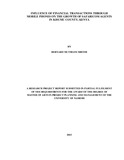| dc.description.abstract | Financial transactions through mobile phones are one of the most recent emerging technologies that have enhanced financial inclusion through creation of decentralized financial service supply chains. This study reviewed the global, regional and the national background of financial transactions through mobile phones and resulting effect to service distributors. The purpose of this study was to determine the influence of financial transactions through mobile phones on the growth of Safaricom agents in Kisumu County in Kenya. The study sought to address the following objectives; determine the extent to which financial transactions through mobile phones influence workers, income, assets and personal wellbeing of Safaricom agents. This research proposal adopted a descriptive survey design, which is an arrangement of conditions for collecting and analyzing data in a way that gives a mix of relevance to the study purpose with the economy of procedure. The study covered Kisumu County which has a target population of 30 Safaricom agents. The study employed a census approach since the target population was small and achievable without compromising on data quality which in the past has been pointed out as a limitation to use of census as a method of data collection. In order to reach the respondents, purposive sampling and snow balling were applied. Both questionnaires (to capture quantitative data) and in-depth interviews (for collection of qualitative data) were used in data collection. Questionnaires were designed to pull out information; mostly leading to numeric results while in-depth interview was designed to answer questions that did not have direct numeric results. To ensure reliability in the research instruments, test and retest approach, commonly referred to as a study within a study was used. The pilot testing was carried out in Kakamega Municipality. Validity of research instruments was done through review by supervisors whilst ensuring clarity in language in order to capture the relevant data. Reliability of the questionnaire was tested using the empirical procedure of split-half by application of correlation coefficient using r-function of spearman Brown Prophesy formula to establish the correlation between the two halves .Data analysis was done twofold; one data from verified questionnaires was analyzed through descriptive statistics while qualitative data was analyzed by use of content analysis. Analysis was done using, frequencies, percentages and mean aided by Statistical Package for Social Sciences and Excel. The findings indicated that Safaricom agents had training programs for staff and the number of workers increased from 166 in 2008 to 641 in 2012. The study also revealed that agents had positive growth in income, assets and personal wellbeing through assessment of health, shelter and leadership in 2008 to 2012, resulting from their participation in the money mobile network agency. These revelations were considered in the study as contributions to body of knowledge. Few gaps came out during the study and hence policy and areas for further study were suggested. | en |

